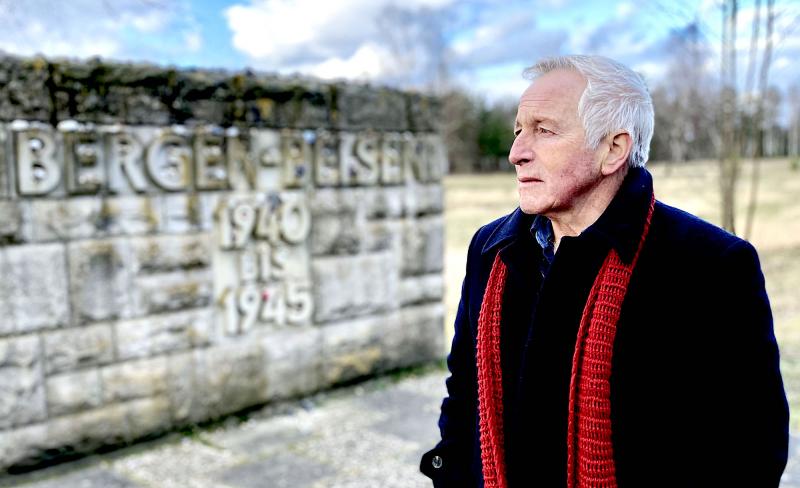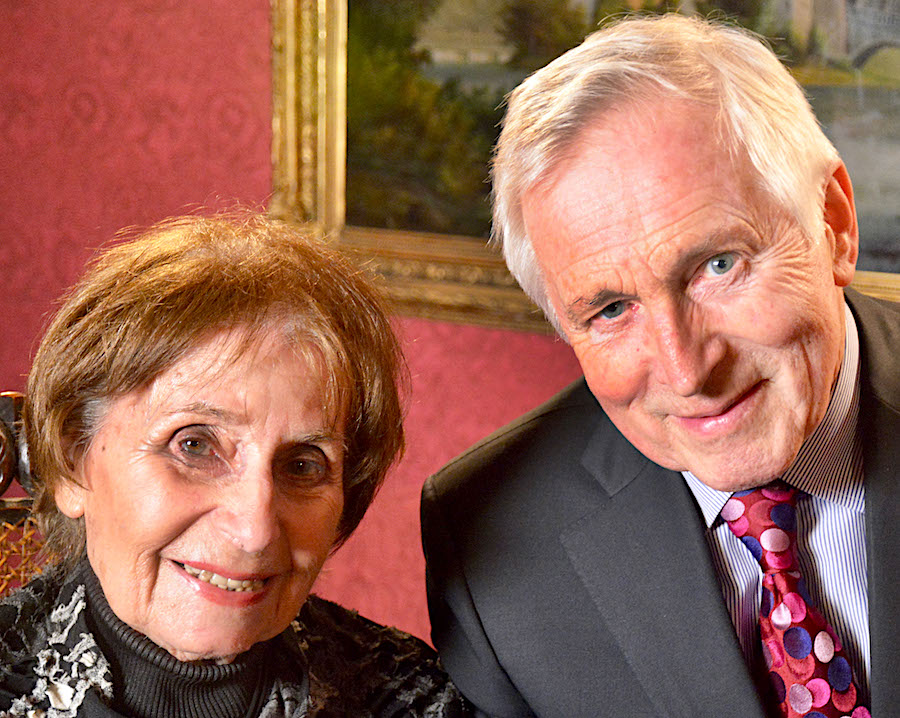Return to Belsen, ITV review - Jonathan Dimbleby retraces his father's journey to a nightmare world | reviews, news & interviews
Return to Belsen, ITV review - Jonathan Dimbleby retraces his father's journey to a nightmare world
Return to Belsen, ITV review - Jonathan Dimbleby retraces his father's journey to a nightmare world
Are the terrible lessons of the Holocaust in danger of being forgotten?

When the notorious Bergen-Belsen concentration camp in northern Germany was liberated by the British 11th Armoured Division on 15 April 1945, the BBC’s reporter Richard Dimbleby was there to record the occasion.
There were some unmistakeable similarities between this ITV film and BBC Two’s Belsen: Our Story, broadcast in January, not least the presence in both of Belsen and Auschwitz survivor Anita Lasker-Wallfisch. However, the Dimbleby connection was the unique selling point of this offering, since it was presented by Richard’s son Jonathan (who published a biography of his father in 1975). As well as bringing in survivors to tell their own stories, many of whom were only children when the British arrived, Dimbleby wanted to explore the way witnessing the Belsen slaughterhouse had affected the liberators. The former Corporal Ian Forsyth, 21 in April 1945, was left so traumatised that even now he can barely speak about it – “I can’t get rid of it,” he said, reduced to a pitiful state of tearful misery (pictured below, Dimbleby with camp survivor Zdenka Fantlova).
 Evidently Dimbleby Snr was deeply affected too, since he never once talked to Jonathan about it. His reports from the scene have been preserved as part of the official Holocaust archive, as if his sonorous and authoritative voice might put a stamp of authenticity on the records, to future-proof them from Holocaust deniers or neo-Nazis who might spring up later. High-quality documentary film from 1945, shot in seemingly higher resolution than many feature films of the era, recorded the fields of corpses and bodies being bulldozed into pits with an unblinking objectivity that was far more devastating than any emotional voice-over or manipulatively mournful soundtrack could have been.
Evidently Dimbleby Snr was deeply affected too, since he never once talked to Jonathan about it. His reports from the scene have been preserved as part of the official Holocaust archive, as if his sonorous and authoritative voice might put a stamp of authenticity on the records, to future-proof them from Holocaust deniers or neo-Nazis who might spring up later. High-quality documentary film from 1945, shot in seemingly higher resolution than many feature films of the era, recorded the fields of corpses and bodies being bulldozed into pits with an unblinking objectivity that was far more devastating than any emotional voice-over or manipulatively mournful soundtrack could have been.
Richard Dimbleby exhorted his listeners “to vow with all your heart that such things will never happen again”, but his son’s film left us with a twinge of doubt. We heard German historian Stephanie Billib warning that “extremists” are working busily to minimise the enormities of the Holocaust. As the last Belsen survivors are dying off, Dimbleby concluded, “anti-semitism and racism seem to be everywhere in the ascendant.” Warm words and good intentions won’t be enough.
The future of Arts Journalism
You can stop theartsdesk.com closing!
We urgently need financing to survive. Our fundraising drive has thus far raised £49,000 but we need to reach £100,000 or we will be forced to close. Please contribute here: https://gofund.me/c3f6033d
And if you can forward this information to anyone who might assist, we’d be grateful.

Subscribe to theartsdesk.com
Thank you for continuing to read our work on theartsdesk.com. For unlimited access to every article in its entirety, including our archive of more than 15,000 pieces, we're asking for £5 per month or £40 per year. We feel it's a very good deal, and hope you do too.
To take a subscription now simply click here.
And if you're looking for that extra gift for a friend or family member, why not treat them to a theartsdesk.com gift subscription?
more TV
 Murder Before Evensong, Acorn TV review - death comes to the picturesque village of Champton
The Rev Richard Coles's sleuthing cleric hits the screen
Murder Before Evensong, Acorn TV review - death comes to the picturesque village of Champton
The Rev Richard Coles's sleuthing cleric hits the screen
 Black Rabbit, Netflix review - grime and punishment in New York City
Jude Law and Jason Bateman tread the thin line between love and hate
Black Rabbit, Netflix review - grime and punishment in New York City
Jude Law and Jason Bateman tread the thin line between love and hate
 The Hack, ITV review - plodding anatomy of twin UK scandals
Jack Thorne's skill can't disguise the bagginess of his double-headed material
The Hack, ITV review - plodding anatomy of twin UK scandals
Jack Thorne's skill can't disguise the bagginess of his double-headed material
 Slow Horses, Series 5, Apple TV+ review - terror, trauma and impeccable comic timing
Jackson Lamb's band of MI5 misfits continues to fascinate and amuse
Slow Horses, Series 5, Apple TV+ review - terror, trauma and impeccable comic timing
Jackson Lamb's band of MI5 misfits continues to fascinate and amuse
 Coldwater, ITV1 review - horror and black comedy in the Highlands
Superb cast lights up David Ireland's cunning thriller
Coldwater, ITV1 review - horror and black comedy in the Highlands
Superb cast lights up David Ireland's cunning thriller
 Blu-ray: The Sweeney - Series One
Influential and entertaining 1970s police drama, handsomely restored
Blu-ray: The Sweeney - Series One
Influential and entertaining 1970s police drama, handsomely restored
 I Fought the Law, ITVX review - how an 800-year-old law was challenged and changed
Sheridan Smith's raw performance dominates ITV's new docudrama about injustice
I Fought the Law, ITVX review - how an 800-year-old law was challenged and changed
Sheridan Smith's raw performance dominates ITV's new docudrama about injustice
 The Paper, Sky Max review - a spinoff of the US Office worth waiting 20 years for
Perfectly judged recycling of the original's key elements, with a star turn at its heart
The Paper, Sky Max review - a spinoff of the US Office worth waiting 20 years for
Perfectly judged recycling of the original's key elements, with a star turn at its heart
 The Guest, BBC One review - be careful what you wish for
A terrific Eve Myles stars in addictive Welsh mystery
The Guest, BBC One review - be careful what you wish for
A terrific Eve Myles stars in addictive Welsh mystery
 theartsdesk Q&A: Suranne Jones on 'Hostage', power pants and politics
The star and producer talks about taking on the role of Prime Minister, wearing high heels and living in the public eye
theartsdesk Q&A: Suranne Jones on 'Hostage', power pants and politics
The star and producer talks about taking on the role of Prime Minister, wearing high heels and living in the public eye
 King & Conqueror, BBC One review - not many kicks in 1066
Turgid medieval drama leaves viewers in the dark
King & Conqueror, BBC One review - not many kicks in 1066
Turgid medieval drama leaves viewers in the dark
 Hostage, Netflix review - entente not-too-cordiale
Suranne Jones and Julie Delpy cross swords in confused political drama
Hostage, Netflix review - entente not-too-cordiale
Suranne Jones and Julie Delpy cross swords in confused political drama

Add comment